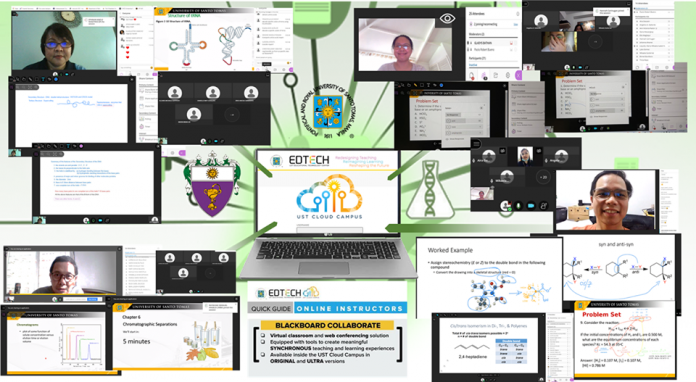FILIPINO students may not yet be ready to handle online classes without the supervision of teachers, as the “new normal” of remote teaching amid the Covid-19 pandemic looms.
Asst. Prof. Anna Cherylle Ramos, director of UST’s Educational Technology (EdTech) Center, stressed the importance of teachers’ presence in online learning during the webinar “Learning in Focus” organized by the Philippine Daily Inquirer last June 26.
“Now that there was a sudden shift from face-to-face to fully online courses, students may not be really ready for self-directed [learning] and become independent without much prodding from the teachers,” Ramos said.
Ramos noted that UST is a pioneer in e-learning in the Philippines, having adopted it on a massive scale beginning 2002. Still, Thomasians prefer face-to-face learning over online methods.
Ramos also said weak internet connections and availability of gadgets were obstacles for students.
“We had the edge of implementing our continuity plan right away after the declaration of the lockdown which stated explicitly what the faculty members and administrators were implementing, while we shifted to [emergency] remote teaching,” she said.
Because of the lack of stable connections, Ramos said administrators ordered a shift to self-paced learning to finish Term 2 of Academic Year 2019-2020, meaning students could access online content at their convenience or when their connections became stable.
She noted that 98 percent of faculty and 94 percent of the students did not have stable connections, based on internal surveys.
But students were not used to distance learning.
“Students think that if they don’t see their teachers in a virtual class like this they thought that the teachers are not teaching,” Ramos said.
“In fact, the learning activities themselves and the step-by-step procedure given by the teachers was in fact the teaching presence,” she added.
Dean Jorge Bocobo, dean of the College of Information Technology and Engineering of De La Salle University-Lipa, said involvement of people in the education sector should evolve amid the pandemic.
“I guess the bigger problem is much more psychological and cultural. It’s getting the people who are involved, the teachers, parents, administrators, to adjust to a revolution that is forcing us, the pandemic,” Bocobo said during the Inquirer webinar.
‘Not more effective than the other’
Barbara Stern of James Madison University in Virginia, in her research titled “A Comparison of Online and Face-To-Face Instruction in an Undergraduate Foundations of American Education Course,” found that students needed to be familiar with their own learning styles for online learning to be effective.
“For students, a familiarity with their own learning styles and the desire and motivation to shoulder responsibility for online learning will be major factors in their success,” Stern said.
Stern also found that students who have better reading and writing proficiency performed better in online learning.
Assoc. Prof. Rene Tadle, lead convenor of the Council of Teachers and Staff of the Colleges and Universities of the Philippines, told the Varsitarian in an online interview that traditional means of learning did not bear significant results when pitted against online learning.
“As regards the effectiveness of online classes there are studies that showed that neither face-to-face nor online was more effective than the other in connection with students’ achievement and their perceptions of course effectiveness,” he said.
Tadle also underscored the disparity among universities in the Philippines when it came to online learning resources.
“The truth is schools are not the same. Some are more ‘on-line ready’ than others. The online learning delivery system of some of these schools will improve some more in the months to come,” he said.
‘Students first’
For JB Bejarin, president of Sanggunian ng mga Paaralang Loyola ng Ateneo de Manila, all stakeholders should be consulted in drafting curricula for online learning, especially the students.
“The reality naman po kasi ngayon e hindi po natin alam kung kailan matatapos ‘yong Covid 19 (The reality is we do not know when this Covid-19 pandemic will end),” he said.
Civil Law freshman Cedric Emmanuel Villaran said his class’ experience was difficult because not all professors were able to maximize online platforms.
“Online class is not for all…law school is even far difficult if conducted virtually and not formally,” Villaran said.
He claimed that many of his classmates were burdened by self-directed learning as they depended on the professors’ supervision, and many might consider applying for leave of absence next semester.
“Not all students can teach themselves without guidance of professors and students learn more effectively when their teachers take great part,” he said.
Trisha Ifurung of the League of Filipino Students-UST said learning became mere completion and called on the administrators to adopt a more inclusive approach.
“Looking back, there could have been more effective means to go about with learning if the University and government listened to the plight of the students,” she said in an interview.
“I may be privileged to own gadgets and enjoy Wi-Fi at home … [but] there are people who are still struggling to make ends meet amid a health and political crisis,” she added.
Paulo Miguel Garcia, a senior high school student, told the Varsitarian that hours in front of the screen might be exhausting, but online classes could become effective if done right.
“With the right curriculum and implementation, a conducive environment, and equal access to the internet and devices, I think online classes will be effective in delivering its purpose,” he said.
Joey Gutierrez, a theology professor from the University’s Institute of Religion, said educational institutions should be able to adapt to changes in order to survive.
“The epidemic should not stop us from learning. The quarantine is here to help us, not to paralyze us. The best way is to adapt,” he said.



















